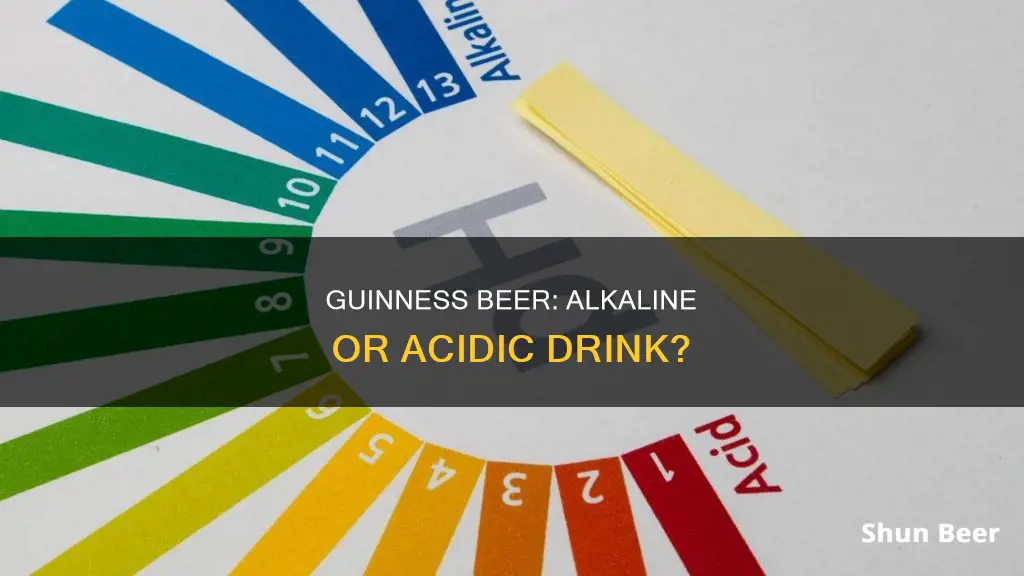
Guinness is an Irish stout with a distinctive dark colour and creamy head. It has a relatively low alcohol content of 4.2% ABV and is known for its smooth, velvety texture. But is Guinness acidic or alkaline?
On the pH scale, Guinness would be considered slightly acidic, with an average pH of 4 for beer. Guinness' smoothness is due to its low acidity and the use of nitrogen, which gives it a creamier and less sharp taste compared to beers that use carbon dioxide.
While Guinness is advertised as having health benefits, such as being good for the heart and containing iron, there is conflicting research on the health effects of alcohol consumption. Guinness itself does not make any health claims about its beer.
| Characteristics | Values |
|---|---|
| Acidity | Low acidity |
| Alcohol by volume (ABV) | 4.1% to 4.3% |
| Ingredients | Water, barley, roast malt extract, hops, and brewer's yeast |
| Calories | Relatively low in calories |
| Colour | Very dark shade of ruby |
| Taste | Creamy, smooth, less abrasive |
| Brewing method | Nitrogenation |
| Brewing temperature | 6-7 °C |
What You'll Learn

Guinness is less abrasive than other beers due to its low fizziness
Guinness is a stout that originated in Dublin, Ireland, in the 18th century. It is now one of the most successful alcohol brands worldwide, brewed in almost 50 countries and available in over 120. Guinness is made from water, barley, roast malt extract, hops, and brewer's yeast. A portion of the barley is roasted, giving Guinness its dark colour and characteristic taste.
Guinness is known for its smooth and creamy texture, which is achieved through a combination of nitrogen and carbon dioxide. Nitrogen is less soluble than carbon dioxide, allowing the beer to be put under high pressure without making it fizzy. This results in smaller bubbles and a "creamier" and "smoother" consistency compared to beers that use only carbon dioxide.
The perceived smoothness of draught Guinness is due in part to its low acidity and the creaminess of the head caused by the nitrogen. The low level of carbonation in Guinness contributes to its smooth and creamy mouthfeel. This is in contrast to the "Original Extra Stout" variety, which contains only carbon dioxide and has a more acidic taste.
The low fizziness of Guinness is often cited as a reason for its easier drinkability and reduced impact on the stomach compared to other beers. Some people report that switching from lager or ale to Guinness has helped with acid reflux and stomach inflammation. The lower fizziness of Guinness may be a contributing factor to these reported benefits, as excessive carbonation can aggravate the stomach and contribute to acid reflux.
In addition to its smooth texture and low fizziness, Guinness is also lower in calories than the average beer due to its relatively low alcohol content of around 4% ABV. The alcohol content is the main source of calories in beer, so the lower alcohol content of Guinness contributes to its lower calorie count.
While Guinness may be easier on the stomach and have a smoother texture due to its low fizziness, it is important to note that excessive alcohol consumption can still lead to negative health effects. Additionally, individual tolerance and sensitivity to carbonation can vary, so while Guinness may be a better option for some, it is always important to drink in moderation and be mindful of personal health considerations.
The Irish Heritage of Guinness Beer
You may want to see also

It has a pH of 4, making it slightly acidic
The pH scale ranges from 0 to 14, with 7 being the neutral value, which is typically the value of pure water. From there on, solutions with a pH under 7 are considered acidic, while solutions with a pH higher than 7 are considered alkaline. The closest to 0, the more acidic a solution is, and the closest to 14, the more alkaline it is. Beer usually has a pH of 4, which makes it slightly acidic. Guinness is a beer, so it is also slightly acidic. It has a pH of 4, which is the same pH as whisky.
Guinness is an iconic Irish beer known for its velvety mouthfeel and richness. It is also known for several touted health benefits, like its iron content and being good for your heart. Guinness is also lower in calories than the average beer, even though it has a richer mouthfeel and fills you up. This is because Guinness is 4.3% ABV, whereas most popular lager beers in the U.S. are at least 5%. Alcohol is the main source of calories in any alcoholic beverage, so a Guinness will naturally be lower in calories than a beer containing 5% alcohol or more.
The perceived smoothness of draught Guinness is due to its low acidity and the creaminess of the head caused by the nitrogen. "Original Extra Stout" tastes quite different; it contains only carbon dioxide, causing a more acidic taste. Guinness's flavour derives from malted barley and roasted unmalted barley. The unmalted barley is a relatively modern addition that became part of the grist in the mid-20th century. For many years, a portion of the aged brew was blended with freshly brewed beer to give a sharp lactic acid flavour. Although Guinness's palate still features a characteristic "tang", the company has refused to confirm whether this type of blending still occurs.
Guinness vs Beer: What Sets Them Apart?
You may want to see also

It's lower in calories than the average beer
Guinness beer is lower in calories than the average beer. A 12-ounce serving of Guinness Draught has 125 calories, while the same size serving of Budweiser has 145, Heineken has 142, and Samuel Adams Cream Stout has 189. Even Guinness Extra Stout, which has a higher ABV than Guinness Draught, has more calories, at 149.
The reason for this is that Guinness Draught has a lower alcohol content, at 4.2% alcohol by volume, compared with 5% for Budweiser and Heineken, and 4.9% for Samuel Adams Cream Stout. Since alcohol is the main source of calories in beers, Guinness Draught's lower alcohol content makes it lower in calories.
In addition to being lower in calories, Guinness also has some nutritional benefits. It contains significant amounts of antioxidants, B vitamins, soluble fibre, and prebiotics, which promote the growth of "good" bacteria in the gut. It also has a fair amount of folate, a B vitamin that the body needs to make DNA and other genetic material.
However, it's important to remember that Guinness is still alcohol, and consuming too much can have negative health effects. Heavy drinking and binge drinking are associated with health problems such as liver disease, pancreatitis, and high blood pressure. Therefore, it's important to consume Guinness in moderation and to be aware of the potential risks associated with excessive alcohol consumption.
The Science Behind Guinness's Foam: Why It's Essential
You may want to see also

Guinness is one of the richest sources of nutritional benefits in beer
Guinness contains a fair amount of folate among imported beers. Folate is a B vitamin that our bodies need to make DNA and other genetic material. It is also necessary for cells to divide. Guinness also contains more folate, a nutrient we need to make DNA and other genetic material, than any other beer.
According to a brewing expert, Charles Bamforth, there are plenty of nutritional benefits in most beers, including antioxidants, B vitamins, fiber, silicon and prebiotics. He says Guinness is one of the richer sources of these nutrients. Bamforth has also researched and co-authored studies published in the Journal of the Institute of Brewing and the Journal of the American Society of Brewing Chemists.
A 2021 review in Nutrients found that moderate beer consumption—up to one beer per day for females and two per day for males—is associated with a decreased risk of cardiovascular disease and overall mortality. Moderate beer consumption may also increase bone mineral density, according to this review.
The polyphenols from barley and hops in Guinness have been shown to lower cholesterol, reduce your risk for heart disease and protect against free radicals, according to research like the 2020 review in Nutrition Reviews.
Guinness is also lower in calories than the average beer, even though it has a richer mouthfeel and fills you up. Bamforth says Guinness is 4.3% ABV, whereas most popular lager beers in the U.S. are at least 5%. Alcohol is the main source of calories in any alcoholic beverage, so a Guinness will naturally be lower in calories than a beer containing 5% (or more) alcohol.
Guinness uses a process called nitrogenation, which pairs nitrogen gas and carbon dioxide to give the beer its iconic velvety texture. This is similar to how drinking nitro cold brew is silkier than a regular cup of cold brew coffee, making it seem more filling without adding any extra calories.
In conclusion, Guinness is one of the richest sources of nutritional benefits in beer, offering a range of health benefits such as lower cholesterol, reduced risk of heart disease, and protection against free radicals. However, it is important to note that Guinness does not make any health claims about its beer, and excessive alcohol consumption can lead to various health problems.
Guinness: A Manly Beer or Just Dark, Foamy Liquid?
You may want to see also

It's suitable for vegetarians and vegans
Guinness is now suitable for vegetarians and vegans. The company that manufactures Guinness, Diageo, changed its filtration process in 2016, removing the use of isinglass, which is made from fish bladders. This change means that all Guinness products worldwide, including Guinness Draught, Guinness Extra Stout, and Guinness Foreign Extra Stout, are now isinglass-free and suitable for vegetarians and vegans.
The decision to remove isinglass from Guinness products came after Diageo announced in 2015 that it would be implementing a new filtration system to make Guinness suitable for vegetarians and vegans. This new filtration process does not alter the taste, texture, or character of the beer, so you can still enjoy the same great taste of Guinness.
The change to a vegan-friendly filtration process was first confirmed for kegs of Guinness, with the manufacturer unable to guarantee that old stock in bottles and cans had been filtered using the new process. However, in 2018, Diageo confirmed that all Guinness products, including bottled and canned, were now suitable for vegetarians and vegans.
Guinness is now one of the world's most popular drinks, with 10 million pints consumed daily and 1.5 billion pints enjoyed annually. The drink is available in over 100 countries, with West Africa, particularly Nigeria and Cameroon, being significant markets.
So, if you're a vegetarian or vegan, you can now enjoy a pint of Guinness, safe in the knowledge that it is suitable for your dietary requirements.
Guinness Beer: Artificial Coloring or Natural Magic?
You may want to see also
Frequently asked questions
No, Guinness is not alkaline. Guinness is a slightly acidic drink, with a pH of around 4.
Guinness is acidic because it has a pH of 4, and solutions with a pH under 7 are considered acidic.
Guinness is more acidic than some beers, and less acidic than others. Lagers tend to be less acidic than ales, and darker beers are usually less acidic. Guinness is a stout, which is a type of ale, and it has a pH of 4, so it's more acidic than most lagers, but less acidic than tequila and brandy.
Some people with acid reflux find that Guinness causes fewer symptoms than other beers, but this varies from person to person. Guinness is relatively low in carbon dioxide, which can be abrasive and cause inflammation. However, it's still alcohol, which can irritate the stomach, and it's better to switch to non-alcoholic drinks if you have reflux.







